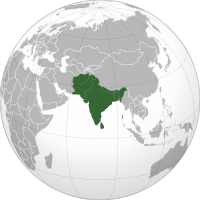History of South Asia

Okay, kiddo, let's learn about the history of South Asia!
South Asia is a big place made up of countries like India, Pakistan, Bangladesh, and Sri Lanka. People have lived there for a very long time, even before we started keeping records.
But here's what we do know: a long time ago, there were lots of different groups of people living in South Asia. They had different languages, traditions, and beliefs.
One of the earliest big civilizations in South Asia was called the Indus Valley Civilization. They lived in what is now Pakistan and northwest India from about 2600 BCE to 1900 BCE. We don't know a lot about them because we can't read their writing, but we think they built big cities and had a system of writing, trading, and farming.
After the Indus Valley Civilization, there were other big kingdoms and empires that ruled parts of South Asia. One of the most famous was the Maurya Empire, which was in power from about 321 BCE to 185 BCE. They were known for their big army, their system of government, and their leader, Emperor Ashoka, who converted to Buddhism and spread it throughout South Asia.
Another big empire was the Mughal Empire, which ruled from about 1526 CE to 1857 CE. They were Muslim and came to South Asia from what is now Uzbekistan. They built beautiful palaces, gardens, and mosques, and their rulers were known for their wealth and power.
But all of these different empires and kingdoms eventually fell apart, sometimes because of wars or invasions, sometimes because of internal problems.
In the 19th and 20th centuries, South Asia was colonized by European countries like Britain and Portugal. This means that these countries came in and took control of parts of South Asia, set up their own governments and laws, and took resources like tea, spices, and cotton. This was a difficult time for many people in South Asia, and it eventually led to movements for independence and freedom from colonial rule.
Today, South Asia is made up of many different countries with their own languages, cultures, and religions. But they all share a rich history and a deep connection to the land and people who have lived there for thousands of years.
South Asia is a big place made up of countries like India, Pakistan, Bangladesh, and Sri Lanka. People have lived there for a very long time, even before we started keeping records.
But here's what we do know: a long time ago, there were lots of different groups of people living in South Asia. They had different languages, traditions, and beliefs.
One of the earliest big civilizations in South Asia was called the Indus Valley Civilization. They lived in what is now Pakistan and northwest India from about 2600 BCE to 1900 BCE. We don't know a lot about them because we can't read their writing, but we think they built big cities and had a system of writing, trading, and farming.
After the Indus Valley Civilization, there were other big kingdoms and empires that ruled parts of South Asia. One of the most famous was the Maurya Empire, which was in power from about 321 BCE to 185 BCE. They were known for their big army, their system of government, and their leader, Emperor Ashoka, who converted to Buddhism and spread it throughout South Asia.
Another big empire was the Mughal Empire, which ruled from about 1526 CE to 1857 CE. They were Muslim and came to South Asia from what is now Uzbekistan. They built beautiful palaces, gardens, and mosques, and their rulers were known for their wealth and power.
But all of these different empires and kingdoms eventually fell apart, sometimes because of wars or invasions, sometimes because of internal problems.
In the 19th and 20th centuries, South Asia was colonized by European countries like Britain and Portugal. This means that these countries came in and took control of parts of South Asia, set up their own governments and laws, and took resources like tea, spices, and cotton. This was a difficult time for many people in South Asia, and it eventually led to movements for independence and freedom from colonial rule.
Today, South Asia is made up of many different countries with their own languages, cultures, and religions. But they all share a rich history and a deep connection to the land and people who have lived there for thousands of years.
Related topics others have asked about:
